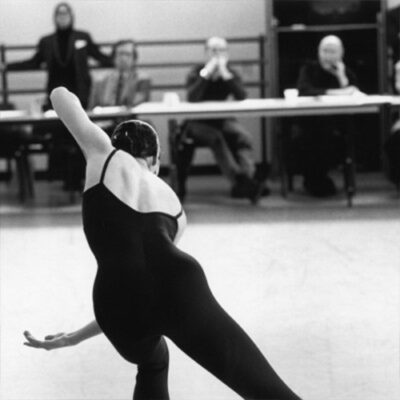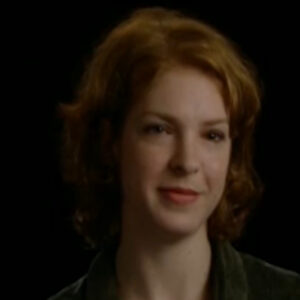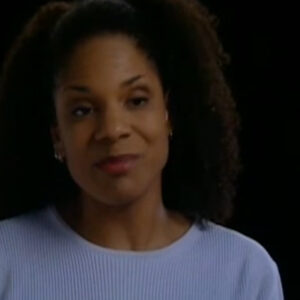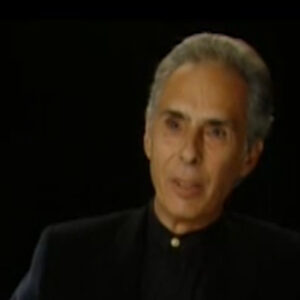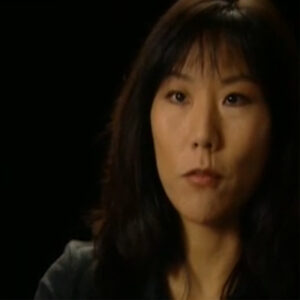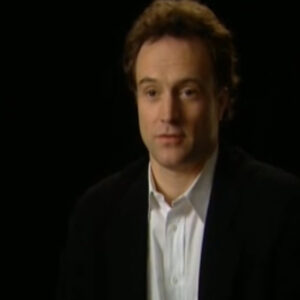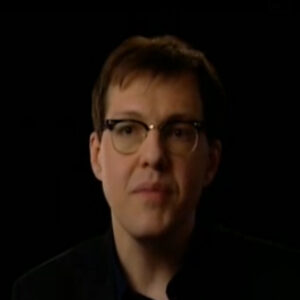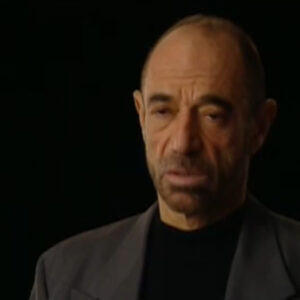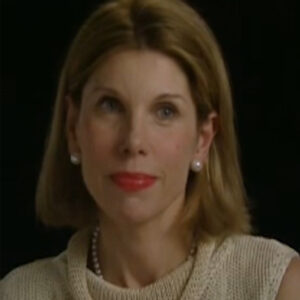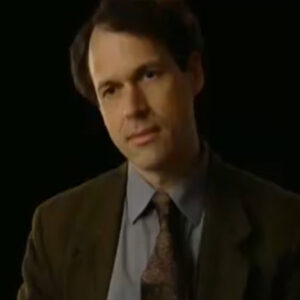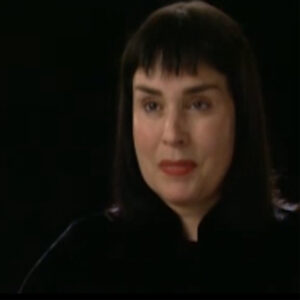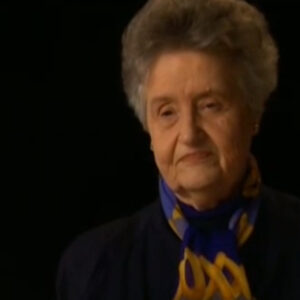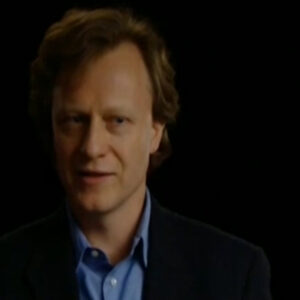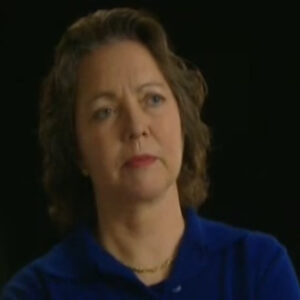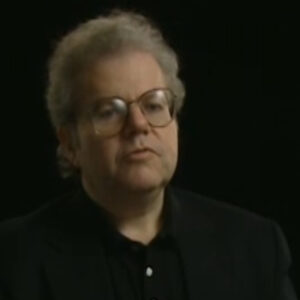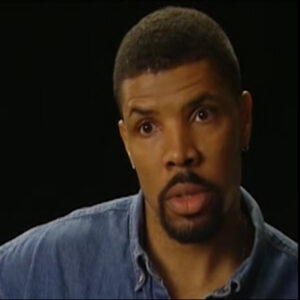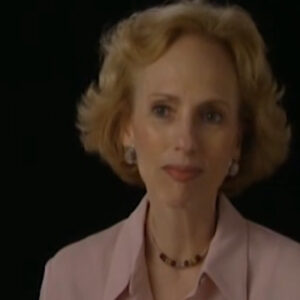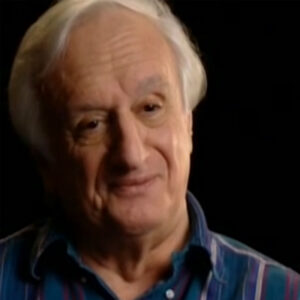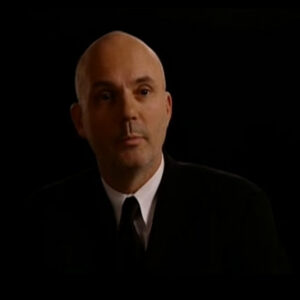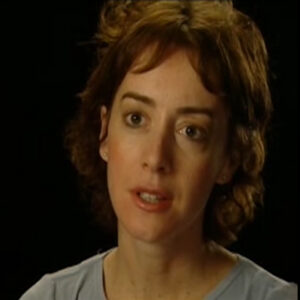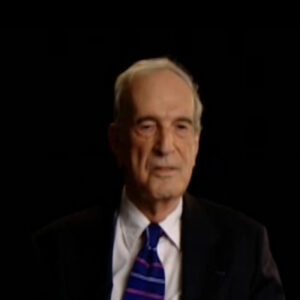Speaker Well, I was doing a show in Missouri, I’m from Kansas City originally, and I was out there doing a show at the University of Missouri, Kansas City. And then I went to school at Lincoln University in Jefferson City, Missouri. And they wanted to do this show again. Raisin in the Sun would show it. So I was traveling back and forth from Jefferson City, Missouri, to Kansas City doing this play. And Dr. McIlrath, who was a wonderful, wonderful woman theater there, University of Missouri, Kansas City, wanted to have some students from her program because she knew John Houseman from some years ago and she’d asked him to come through and audition there. And they didn’t take as the students that she felt that they should have taken. And as an afterthought, she called the woman who directed this show and said, get that kid, that kid that did this show here and see if he’ll go to Chicago and audition under our banner. So former teacher said, here’s go to Chicago and audition for this school. I didn’t know anything except I thought the world of her. And I said, if if Gloria said go and do this, then I should go and do this. And. And I went to Chicago and it was at the Jane Adams Theater, I remember. And an audition for John and Michael Kahn. And it was it was my second trip to Chicago. And I grew up in Kansas City. So going to Chicago was like going to Moscow.
Speaker Sandy is going to Chicago, the blues town, jazz time. And so I said, sure, I’ll go to Chicago if she says cold in Chicago. And.
Speaker And I did a, you know, a piece from Raisin in the Sun and a piece from Hamlet, the Hamlet, advice to the players. And I think John thought that was funny that he said, so you do A Raisin as your serious piece. What’s your comic piece? And I said, well, Hamlet, you know. So he thought that was kind of unique opportunity. Sidibé baby. So and then I went through all the motions of all the improvs that he’d he’d send you through things about you’ve got one match and you’re in a cave and then you’ve got to find your way out. And the match is getting shorter and they just, you know, literally sighed. Coach you through Prouse and. And and I, I, I felt it went well. They asked me, in fact, when I went back to Kansas City, and Gloria says, well, how did it go? I said, I don’t know. Says, what do you mean? Well, I felt like it went OK. They asked me to go to lunch with them, but I didn’t want.
Speaker She says they asked you to go to lunch with them. That’s the that’s some indication that maybe it was going OK. So I said, well, we’ll see.
Speaker And as it turned out, you know, I got I got asked to come and it was was just amazing. And I really didn’t I really thought you were quite right. It was an unknown commodity. I mean, Juilliard wasn’t an unknown commodity, but what this this training program was gonna be, you know, I didn’t know I really didn’t know a thing about it and had only done very little Shakespeare. I mean, in had a fabulous teacher in high school, was into poetry. I love poetry. And that’s kind of how I got into acting. I was raised by I didn’t grow up with my parents and the people who took me in. The woman was in vaudeville, in black vaudeville. So she used to he’d be home from school and teach me these old routines. And I knew all the oldest jokes. I knew some of the oldest jokes. And I’d do these old jokes and try to do the little singing and dancing. But when I when I was young. People let you get away with that. You say he’s a little cute little ways and little fat boy with freckles. And so I sing and dance.
Speaker But, you know, I really didn’t have great a future as a musical comedy person in terms of singing and dancing, but I was never afraid to get up in front of group. And so then when when the poetry came in, when I when I started really loving poetry and I was not afraid to go up a front group when I started when I saw play the first time I saw, wow, this is really something you don’t have to you don’t have to know how to sing a dance because I didn’t I’d always go off key to it and I couldn’t dance. And I said, what you can really you can really just, you know, live and live fully. And I just fell in love with the theatre as well. And but it was Juilliard where you really I really started to see the size and the scope of of drama of the theater. And it cause in Kansas City was mainly well, mission oriented, was very motivated by the times.
Speaker I was I was in high school. I will graduate from high school in sixty seven. So the groups that I was that I worked with, we did James Baldwin’s plays and Baracas plays Lorraine Hansberry and but they were they were really issue oriented things. So and an early television kind of inform because I just loved the Playhouse 90 and all those live dramas that came out of New York, you know, so. So it was really, really always issue when and movement oriented the dramas and plays that.
Speaker Did what was it like when you first you know, you’re going to be going.
Speaker Going to Chicago had been like Chicago?
Speaker Oh, boy. Well, you know, and I went I didn’t know anyone.
Speaker Is there any reason to think that the surge would tell he’s out?
Speaker Listen, it was interesting. I got a bus from the airport and I went to Sloane House Y and that was the only lead I had on a place. I didn’t know anybody there and my family didn’t know anybody there. So I. I stayed there about two days before I realized that I was they all stay here and and then a little by little got to know the city. I credit my my good friend Jim Moody, who was in the classes teaching me how to ride the subways and getting a lot of support out of that, too. We’ll play some tricks on me. But I did learn the system and and I lived in the Lower East Side between A and B on Holston for a while.
Speaker And then finally I got close to the school uptown around Realness Hall, over one hundred twenty second and Amsterdam and so and the school was uptown and you know, the Juilliard School was a was uptown then.
Speaker So and we’d we had classes at the International House of Claremont Avenue and I wasn’t able to get a place in a lot of the people in the class. Few of them were able to get apartments or rooms there in that building, but I wasn’t able to.
Speaker And so.
Speaker You know, New York, I was I just walked around with my head up and with my eyes open watching everything, and it was fabulous. It was a great season to be there. James Earl and Jane Alexander and Great White Hope and down Pleasance and man in the glass booth.
Speaker Frank Langella and Anne Bancroft, a cry of players. And Lee Jay Cobb was doing his Lear and Rene Albertan LA was on faculty at Juilliard. So you don’t get to go and see him. And he was working with. With Lee Jay Cobb. And then he did it. Coko with Katharine Hepburn. I mean, it was just really quite incredible to to go there and see all this work and we would get tickets. You know, they would they would say you should go out and see things. And it’s just that’s just heaven. You call it the York and they give you tickets. The the these ls. So I was I was quite thrilled and and always a cause. I’m from Kansas City. I love the music and the jazz music. So the music was also incredible to me. Once I got uptown and you know, got to hang out with some people and there was a gentleman, Hank Johnson, who played for Anna Sokoloff dance classes. He was in a company where he was also a great jazz player. He played with Clark Terry and some other cats.
Speaker And so it was just great to have that connection and and also to realize that because he would play could play anything they wanted him to play for those dance classes. And then and then then he’d go in and kick it with, you know, the trio combo or something. And that was just fabulous to me because that I hadn’t seen it like that.
Speaker I just hadn’t seen that span where where, you know, cause cause at the same time that when a school was starting sixty eight, sixty nine was a lot of rhetoric on the street. There was a lot of stuff going down and I got a lot, lot of friends who were into other things and were saying, what are you doing down there studying that stuff. You know, you ought to be out here doing this, this thing. And. And I did both things, but it was there was some intolerance on the part of the revolutionaries, the revolutionary, you know, cultural nationalism, all that kind of stuff. And Baraka Leroy Jones, who I had worked with in Kansas City and got to know who was very supportive. As a matter of fact, a lot of people thought that he might have been a naysayer, but he he’s the guy who said you can you can embrace anything you want. Stevie said, as long as you don’t let it let you lose your naturalness, don’t come back with a British accent and start acting all funny with me and knee and crumpets when we’re, you know, but. So he he really did, you know, endorse and and say, you know, go be all that you can. But it wasn’t it wasn’t that easy for me personally that I wouldn’t I don’t put it on anything else. I mean. But but what was happening for me, they’re really crucial is that this classic discussion of art and politics and the idea of someone fiddling while Rome is burning, that that how can you if you can’t, can be cloistered away in a practice room while 1968, 1969 was going on around you, then you were truly dedicated.
Speaker And that’s I think that’s fabulous. That’s wonderful. But it depends on where you come from. And you know what what drummer you hear that is very difficult to be cloistered away in that very embryonic practice room with all these wonderful colleagues. I mean, it’s fabulous faculty and and the audience, the people you’ve got to work with, you know, the other people. And Clay was just fabulous. But but I just couldn’t just do that. That wasn’t possible for me personally. It wasn’t possible.
Speaker So how how are the rest of your colleagues? You know? Let’s go back a little bit to when you first got there. The you know, who was there?
Speaker Who were these all Britain. Were you from.
Speaker Well, you know, Ataman, everybody was it was really great to see because the first thing you see, I’m from Kansas City, so I go there and I and I’d been in all segregated schools and it was my high school started to integrate at the very end, but they only integrated the faculty, the creative students there.
Speaker And then I went to my first year college was a land grant college founded by the Black Cavalry in Jefferson City, Missouri, Lincoln University. So and they had we had white students there, but they were the day students.
Speaker They were students who lived in the town and came to classes during the day. But all the students on campus were African-American. So I had been primarily in that kind of educational environment. So Julia was first time that I was in an integrated classroom and also in the minority in terms of education, because I’ve been, you know, always in these other schools, so. Norman and I hooked up really, really quick because he was from Arkansas, I think, and he had all the Southerners I got along with right away, got a straight white. And Norman did a great Ray Charles imitation. So he and I just we kind of clicked. And then David SRAM, who was from Kentucky, from Louisville, and he and I talk and then talk about Ali and stuff like. And Jim Moody, who was there. But Jimi, the thing is, Jimmy had gone to performing arts high school. So he had been really in the arts for a long time. I hadn’t, you know, been I I did it as a sort of a side thing. I was a math major in school and political science major. And I would do plays and loved it. But I had never really been in a arts kind of conservatory environment.
Speaker And Michael Darden, who’s wonderful cat, who was there and wonderful actor, had worked with Father Jonathan in the street theater at the time and had had done The Miracle Worker with Patty Duke. And Anne Bancroft was the slave boy who was in that in that that Anne Sullivan took with with, you know, Helen Keller to to teach her to read that. And so he had he had had experience in the business as well. I mean, that really worked. He’d been in film and done theater there. So they both were very helpful to me.
Speaker And and but I, I, I really sort of got caught more with uptown with the people that I lived with, you know, after the day was over at school. But there were friendships. There’s there’s a fabulous woman named Kathy Cole name who came from Minneapolis. Such wonderful act. This is one of those people where you just I was in a class and we would do the work and I would just look at her work.
Speaker My goodness. Look at the focus, concentration, taste and just all at your end. And we were surrounded by that, you know. And Patty, Patty, Lou, Paul gets burst into song. I mean, she’s just had a voice from incredible power, you know, and.
Speaker And and McDonough. I mean. I mean. And McNorton, I remember and not.
Speaker And there was there were other there were people like there’s a guy named Larry Reimann who did a speech from Hamlet that.
Speaker Oh, that this too too solid flesh with milk. This guy, I saw him, it looked as if he dissolved against the wall and put some puddle there. And I said, this is just fabulous talent. I mean, the people and the teachers were so inspiring. They themselves were. It’s incredible. Mary. And sell these. She’s just she just travels with this light inside her. She’s so inspiring, you know. And Monique Keene, who is a brilliant guy and who paid some serious dues over and over in Israel.
Speaker And that and that was the other thing that the history of these people, John Houseman himself, I mean, the fact that he had was part of the original Lafayette Theater that was now the new Lafayette Theater was a black, but he did the voodoo Scottish play that they they talk about he and Orson Welles with the real voodoo guys drumming in the bay, you know, in all that to have all that.
Speaker And then that ended the modern dress, Julius Caesar and the fact that the War of the Worlds, we’ve literally had a day in that first year, Halloween, when John said, well, I think, well, let’s listen to this tape. And he put the tape in and it was the original, his copy of War of the Worlds with with him and Welles and the cops coming, banging on the door, trying to get in there and tell them, listen, people are taking this seriously. So it was just a part of American theatrical history, you know? And it was just amazing, just just amazing how it helps them.
Speaker How did he work with you? From the very beginning?
Speaker I mean, he was like, you guys are kidding.
Speaker What did you know about what it meant to be? A club to go to a classical training program. Talk a little bit about about Michelle’s friends and how this early kind of well, we’re getting into. What it really was you started.
Speaker Well, I. I had nothing to go on at all.
Speaker But I knew that something very rare and special was happening when Michelle in Syria, whenever they got before class. They brought a tradition from Michelle’s uncle was a couple and that the mask work and his book, Rediscovery of Style. All this the idea of a rediscovery of style that was so in evidence in the whenever Michelle in Syria, his wife would bring out the masks. And Michelle at age. I think eighty two, I believe, would put on the the juvenile mask. And and then go and visit the circus. And you could see him put the mask on. And then suddenly he would encounter the world around. He was discovering everything. And you could see a child discovering the circus. And this this man was in his 80s and he’d had two strokes and he walked very haltingly until he embody that mask. And once he did that, just the slightest tilt of the head. Looking up the wonder. And then when he was sad and he would tilt his head down and turn to the side where he was contemplative and thinking about. So the precision was this was this was a technique that was really being handed down. This was it was it was it was the equivalent of an oral tradition, I guess, except that it was a very, very precise technique that that they were passing on to us. And I knew that this is not just learn your lines and don’t off the furniture.
Speaker You know, I’d say this is the this is the real deal. And and also then in the here to hear Michelle speak of Larry, and he was talking about Sir Laurence Olivier and he was saying when he when he had first worked with with him. And so the traditions that they do sit and listen to them chat between classes was also a lesson, you know, and.
Speaker But, John.
Speaker John directed King Lear of one of the one of the first things they did was they they divided the thirty four or five of us up into two groups. And one group did Midsummer Night’s Dream and the other group did King Lear. So for all these kids who thought they were pretty hot stuff because they’ve been part of this audition process and now they were there, they hit us with something that nobody could handle. So it could take you take you down a peg, you know. And I wanted a name that I should have mentioned earlier.
Speaker Sam Suits of it’s a wonderful actor, all my favorites. And he and I were cast to play King Lear. And he would do some scenes we would both do. And in some he would do. And then I would take over and go on from there. So was this a fabulous experience? And it’s just incredible. And so it brings you down. I mean, it it lets you know that you are you know, the the honeymoon’s over and now it’s about the work because you got hit with this text and just pouring over that. That work was something with with Michelle and it and you in rehearsal and John directing and Liz Smith there for it. For The Voice.
Speaker And and and Edith Skinner, you must do it. Everyone has spoken of her.
Speaker I’m sure she was the diet that the diction coach and she wrote speak with distinction and she would have had to have your number two pencil and a mirror, your mirror and look and look at your equipment and see how you make your sound. And that that I found just absolutely incredible.
Speaker What were your biggest.
Speaker What were you What do you think were your biggest, you know, you’ve got there?
Speaker What do you think it was about you?
Speaker You can be cell phones. Talk about yourself. Phone seeing you.
Speaker And what were you struggling with as an actual person? Were you pegged as something? Where were they looking at you and thinking, you know, this is what we got to work out with.
Speaker We got to get him to stop slurring or be. And how was he?
Speaker Well, I think one of the things was that they said we’ve got to get him.
Speaker To to accept these corrections in life, not just on the stage. In other words, I was talking about Edith. Edith would often say that she could tell exactly what area of the country someone came from by listening to them speak AWA. And so she tried that with me and she kept getting it wrong and jumping all over.
Speaker And she said, because you don’t have one regionalism, you’ve got five regionalisms, you’re terrible. You’re in the worst shape of anyone. So you’ve got to get rid of all these regionalisms.
Speaker And and I wasn’t committed to that. And that was my problem. I was committed to being able to do whatever role correctly. So I didn’t mind, you know, taking one. But I wasn’t I wasn’t about to stop using some of the slangs and some of the inflections and some of the musicality that I found to be part of me. I bet it was already, you know, 18, 19 years old.
Speaker And. And and I perhaps foolishly thought that it meant that I was abandoning something or betraying something of my own roots in that. And so I that was a problem.
Speaker I know that was a problem. And and, you know, but we and we did.
Speaker I remember doing Chosen Women and Marian Marian Saudis like again, just so inspiring.
Speaker She’s inspiring person that you want to you want to please her. You know, you want to do good. And so I would work very hard at that. But then I didn’t think that I had to use the mid-Atlantic speeches, what the time was that we were going to achieve this mid Atlantic speech, as if there was a country somewhere out there between our shores and England where the people with would speak with distinction in this manner. And I struggled with that also, I think. There’s other body image kinds of things that one of the greatest people were, who was a part of that school beginning was Judy Liebowitz. She taught the Alexander technique.
Speaker Yeah. Tell me a little bit about what, Alexander?
Speaker It was a system of body alignment.
Speaker And did you to start just by saying the Alexander technique is a system? No questions asked.
Speaker Oh. Oh, yes. Yeah. Well, yeah. Yeah. Alexander the Alexander technique. It’s a system of body alignment that Judy Liebowitz imparted on us. And she also told us that if it was dry. Because I think of a singer who had lost his voice. I believe Alexander was a singer and he’d lost his voice.
Speaker And they thought that it wouldn’t return. But he thought that if he could do with the proper line, there was a pressure on something on his spine and that with the proper body alignment, he would be able to sing again. And now this in in the pursuit of that, he came up with a system of body alignment that that really helped a lot of people who had been given up on in terms that they would never walk again or they wouldn’t be able to do this. And through through this system of body alignment and I it’s to begin to try to go into detail. I would you would you really should talk to someone who is a practitioner. But what she would do with this table was and she she literally taught us how to walk again, how to sit, how to walk up steps and not be applying pressure to, you know, your spine every time you take some sort of jolting step. And and it was a relaxation technique as well. And she would lay us out on the table and the command was neck free, head forward and up, torso lengthening and widening, neck free, head forward and up, torso lengthening and winding.
Speaker And she would repeat this mantra and and she had magic in her fingers and she would open people up and and then she would get them and and let them stand before the class. And we would look at this person we see everyday and realize that there’s some power, some dynamic coming out of them now and the voice. And that was the thing. It freed the voice and it made. And that was absolutely, you know, I mean, it was concrete. It was it was you know, you could this was something that you could really feel and sense and taste.
Speaker So it wasn’t it wasn’t some, you know, highfalutin idea. This person looked more powerfully, spoke more eloquently. And so there was something that made it converted me, made me a true believer in in the end. The thing that they were building there and at the same time, we were like guinea pigs. I mean, you know, we we had a lot of special attention, but at the same time, they were working this stuff out, you know?
Speaker Yeah. Yeah. Let’s talk about the little you know, they’re figuring it all out with you. How did how did that how did that affect them? And did you feel like you were in a safe place or.
Speaker Oh. Well, I personally, I felt that with with Michelle and Suria there that nothing could go very far awry. They were just they were very, very spiritual presence that they they brought to the work. And and John was was very playful. He was there. He is really just fabulous. He spoiled some of us, you know. So, no, I. Everything they did, they did the best of intentions. You’re absolutely certain of that. But there were conflicting in one sense that there were there were conflicting philosophies and ideologies at work among the faculty. So they were working out things among themselves, you know.
Speaker But I definitely trusted that that they, you know, they were trying to do to be right by us. The unfortunate thing is that there’s always a cut that happens, you know, and it was announced that, you know, you bring in X amount of students. But after a semester, some people will be asked to leave. And that survivor guilt kind of set in on me the first time I had to say goodbye to someone who, you know, was a part of the group, even though I maybe wasn’t very, very close friend with them.
Speaker It’s just. It didn’t sit well with me, and I’m in the second cut, I remember I felt even worse about this. Oh, my God. How could they? And I realized that that was the way of things. You know, I was learning the way of things. But it just didn’t sit that well with me.
Speaker Did you think that. Were you surprised when you saw people being kind of mean?
Speaker How did how did they present to you what your trajectory was going to be you first got there?
Speaker Well, I mean, you you got an interview.
Speaker You know, I mean, go in and John would talk to you about your teachers have all said these things and so on and so forth. So you got some sort of, you know, evaluation. And my first evaluation was it was very good. And I was I was quite, quite glad. Quite. Happy about that, but then in the second time, I had a good evaluation as well.
Speaker But they were also saying, you know, I’m gonna have to make choices about lifestyle. Well, you know, and I guess, as I say, you get in my business here. And I’m saying I come on backup. But and it was a choice. I mean, it was very legitimate. I’m I’m so much better about it now because I realized how much was life stuff that I had to deal with personally when I’d been at Juilliard or any place else. There were some things that I was going to have to deal with. But because I was at Juilliard and in the times that that we were in and I, I mean, I just came with baggage myself being, you know, I mean, the idea of being in a show and they say, I had a director say this to me, was not there, but did this maybe makes this point?
Speaker Directors said, you saw me do a show. Is it. Oh, God, I love your work. I was fabulous in that show. Do do you do the classics? I said, well, yes, I loved it. So why? What’s your favorite role in Shakespeare? And I said, well, you know, I’d really, really love to play Brutus and I and I. Because I hear I’ve read that the plan, as I say, is a thankless role. But I’d love to I’d love to play Brutus. So he said, OK, now we’ll get we’ll we’ll we’ll pick the nose and the wig. And they’ll never know. And will and I said, wait a minute. You know, you just went into a whole other area because now you’re talking about something in my culture.
Speaker So this idea of passing, this idea of being taken for a role while being taken for an Englishman in this play, I’m not interested in that. It’s the universal. It’s that thing that is that that’s human about the character that I’m drawn to. So, I mean, I will do correct speech and so forth, but I’m not going to try to disguise myself and pass. That’s that’s anathema. That’s heinous. The very nature. The idea of it. I find so. And he and I had a big fight. But but that was the thing that was the personal journey because of the childhood that I’d had and because of the particular view of my appearance and so forth, I was was very, very important to me that I’d be a part of the black arts movement that was afoot at the time. And, you know, the wonderful dial test, you know, so wonderful. I mean, it’s a horrible thing.
Speaker But in the civil rights struggle in then in India, Topeka v. Brown case, they got to a place where they they they took these young little black girls and they showed them a white down black doll. And and. And they said, which doll would you. Which doll is pretty? And they would point to the white doll. Which doll. Would you like to play with. And they point to the white doll. And which doll was smart. They point the white down. Is that which doll is most like you? And in that moment when they when they used that test, it was very clear in education something had to happen.
Speaker There is a self image problem going on here. You can’t prefer this. You’ve got to see positive qualities in yourself, you know?
Speaker So I had come to this experience with my own baggage. You see that I. I couldn’t afford personally to to look back and say during this period I was studying and showing myself approved in in the classics in the European in the first class. There was Jimmy and James Moody who graduated. He was the only one of the of the African-Americans in the first class who who who finished the entire program. Mike Darden and I, James Moody, my daughter and I.
Speaker And in the second year, Kathy and. Oh, God. I can’t think of.
Speaker But there were two. Two women who came in the second year. Fabulous. And it was wonderful that they came to it. Shame on me. I can’t remember their names, but. And that that helped a lot because then we saw ourselves as is in a leadership position. And, you know, it’s interesting, you you you complain about face and name when there’s someone else, when you can help, though, you don’t want them to to have a narrow perspective on it. So it helped me to to broaden my perspective on things when the other students came in. But there were the three of us.
Speaker And and I’m trying to think now. And Joe Gutierrez was there and.
Speaker Well, you know, I mean, culturally speaking, I can’t.
Speaker I don’t know if there were any other, you know, minorities that I could think of. I don’t think there were any.
Speaker Do you feel that there was then there was thought on the part of Housman and or Michael Kahn or anyone wonder they were. Do you think that there was a lot of thought as to what this experience might be like for you or what how to take it to.
Speaker I you know, serration what you guys might need from the perspective of roles or or plays that we’re going to be?
Speaker I, I honestly believe that they felt that they they didn’t want to do anything.
Speaker I think they wanted to do the training that they that they knew and they wanted us to. Yeah. Got I got it. You got to wait for that. I think it’s a good siren.
Speaker Why you.
Speaker I think they thought it was best to unify the experience, that there was no reason to do anything particularly special for for anyone because the work is very challenging and.
Speaker But then there was a one act festival in the second year. And I remember this because he said now we’re going to do a one act festival. And if there are any plays that you guys would like to work on, let us know. And I took John a copy of four black revolutionary plays by Leroy Gentles. I’m Mary Berocca. And he read a couple of me. Oh, God. Innocent parties as well as this. What is this? But any red one that he really liked and this is all this is interesting and it’s called great goodness of life. So and it opened a dialogue between he and I where we, you know, began to talk about these plays and the movement and that.
Speaker And and I remember I told him I had been listening to Robson’s or fellow and and I knew that he was aware of it, the HOGGETT and Hosie Ferrar and that famous longest running Shakespeare on Broadway at that time. And and we really talked about that. And he was quite, quite aware that there were there were things that were coming to a head in the 60s. As Robson’s said to some parents once, if you had been with me in the 40s, you wouldn’t have this problem with your children in the 60s.
Speaker And John said there’s a lot to that because he was indeed, as I was saying, these people who started this school, they weren’t some fuddy duddies. They weren’t some, you know, lofty ivory tower artists. They had they had paid their dues, you know, on the front line.
Speaker What you get, the last point that you were making was an interesting one.
Speaker Is that your thing? Yeah. We weren’t in the hands.
Speaker Yeah. No, they weren’t. They were. Like, for instance, Michael, the first year there, I think with Moses Gunn had done an Othello. Rene just done the film MASH. And I think Brewster McCloud. But John had had experience with the Lafayette Theater this year. So they all had friendships and colleagues and artists that they respected who were African-American artists. So it wasn’t like, you know, we were in the hands of some some people who had no sensitivity at all for that. But there was was really there was just no way to deal with the fact that they had no way to know what that world was outside that we were walking through. I mean, there were just ideas and things being discussed in the in the streets and in nickel, in meetings and clubs and joints that just. You know, every generation somehow only understands its own rhetoric. That’s always going to be a problem. You know, it’s not like there’s something that they could have fixed about the times. They couldn’t fix them, you know, and and it’s really a matter that your head may be one place, but you’re behind.
Speaker Is it? And to to soften Baracas poem, your head may be one place, but you’re behind, isn’t you? You say that you’re you believe in nonviolence.
Speaker And then when the Klan comes attacking and this has happened to me, I was, you know, nonviolent. Nahlah. This is the year before we did Julio. I really thought I was. And then I got in a situation where I wasn’t going to take the head where I was. And you find out if you’re truly that are not when you’re under fire. And that’s what happened.
Speaker My experience at Juilliard is it was such a blessing to have been a part of it. Have friendships of people that I wouldn’t trade those days for anything now, but it was impossible.
Speaker For me, too, to stay there, because I. I.
Speaker I wasn’t being completely fulfilled by that work alone.
Speaker And it took a commitment because they were building a tradition. And I understood it.
Speaker Finally, I really understood because I left the school and tried to come back. And I wanted to come back. And John told me, he said, you know, Steve, I got faculty here. I can’t I can’t possibly allow you to come back to the school. And he we talked and he said, you know, you really. And he wrote a fabulous recommendation for me to go to North Carolina School of the Arts. And I wanted to go to the South. I wanted to be involved in some stuff. And and I went to England and. But I always stayed in touch with John. And we would talk in that. And he he helped me. And I was Raisen doing shows and raising money for on the anti-apartheid organisations. We were doing some Fugard shows and I was working in in Ireland. And Studs Terkel was an honorary chairperson for some money we were raising. And he knew John. And so I’ve always known state. But I guess what I’m saying is I can’t blame the school didn’t. Well, the drama division to Juilliard is just very, very large thing. I mean, I’m so dancers, I’m sure would say when the idea of the Balanchine body came in, they there were people who danced marvelously, but they didn’t fit this image that they, you know.
Speaker And it was really literally a body type. Now, that’s the kind of thing that I would have I had problems with because I would want to be talking about the art, the the the magic that’s inside the person, whatever kind of body type they got let up. That’s you know, that’s just my point of view.
Speaker But but I understand they were building a tradition at this time, 68, 69, 70, 71, when that acting company came out and I was out in the country. I was at Purdue University doing my grad work when they came through and I helped draw a reception for them. And it was the remorse that we the pain to see these guys and see I’m doing fabulous work. I see Kevin and Patti because I didn’t know Kevin that well, were in school, but I got to know him after him. Oh, that’s wonderful. Actor. Sam was Fat Sam. Susie was fabulous. Norman and Mary Lou.
Speaker I saw Mary Lou do a mother courage in South Bend, Indiana, up around Notre Dame when I was a grad school at Purdue. And I used to go and see the acting company whenever they were around. And there was something they would say, oh, you know, I would have loved to have been a part of that ensemble. And it wasn’t until years later when I was doing a show in Dublin and I was a member of the St. Louis Repertory Theater, it was once Colorado Hilton Repertory Theater, and I was a member of a company. I never really was fulfilled. I mean, I was I was living with great remorse until I was a member of a company, because that’s what that was the goal. That’s what they were building. And I was a part of that ensemble. I know. I was. I was. That’s why I’m very glad that that I’m even asked because I didn’t stay there for four years. But but I really do know what they were trying to build. And I was a part of it at one time. And I was a very I was in it. And and it wasn’t until I was a member of a company somewhere that I really felt that I had fulfilled my potential in a sense. And and I thought that man, I think maybe John would be proud of that.
Speaker And then and he was when he heard that I had done his work in Ireland, I saw him years later and he told us soon he said, oh, you’re in the book, Henderson, you horse’s ass. You’re in the book, get the book and read it. And so I said, yeah, OK.
Speaker And here we go. You do it for you. Before he departed, you, you were still there. Tell me a little bit about the you know, this famous lie down.
Speaker I mean, people were I mean, maybe maybe not so much involved in the African-American movie. But, you know, the war was going this was Kent State.
Speaker This was in response to the deaths at Kent State when they did.
Speaker Yeah. So what was the environment from other people? I mean, I know that I read in John’s book, for instance, that, you know, that Paddy thought and said, oh, I don’t really know because, you know, productivity or combat or whatever else.
Speaker I mean, where what was the whole what was the whole environment that led, you know, what was that experience?
Speaker Well, I can say yes.
Speaker Guess as I remember it, I can tell you as I remember it, because I had I was working with Barack, as I say, in Cynthia Herman and I had done a production of Dutchmen to raise some money for some bail for some people who’d gotten in some trouble and so forth.
Speaker And we did that with our summer. And we came back to school and did that show and.
Speaker It was very, very volatile time. And I remember being being told by some students that, you know, you know, you’ve got this. They were very, very proprietary. They were very jealous. They thought it’s the work we’re doing here is the important work here at this school. This is what’s important. And the company that we’re going to be in. So it it really it really there were lines drawn. There were there were lines drawn. Now, when the Kent State event occurred, some some students outside students came into Juilliard and tried to organize them in some things. And I was at this meeting, John was at the meeting as well. And they came up with a very constructive thing to do rather than, you know, they all those people will say, well, don’t go to classes and tear down the building and all that stuff. And they came up with a very constructive thing. And the chamber orchestra, I believe it was, that played taps well. And and there were dancers and actors who were embalmed, makeup embalmed and laid out on the lawn. And they did this. And CBS and NBC, it was a lot of coverage. The cameras came and it was covered. And I guess it was maybe a week later, Jackson State something the horrible thing that happened to Jackson State, students killed.
Speaker And we tried to organize something and they said, no, we’ve we’ve already done our thing. We’ve we’ve done it.
Speaker And it was filmed and we’ve done it.
Speaker So, again, it was as if, you know, this this one statement was this is they were for all of this. This is our comment on the Times. And and it was truly then it was document.
Speaker It was quite beautiful. I saw them do it. I didn’t want to be embalmed and laid down there. So I didn’t lay down.
Speaker But I was I was there passing out. You know, there were other kinds of activities going on around this, and it was quite wonderful. But, you know, the business at hand was indeed establishing and building this tradition and and and the standard of excellence in the arts. I mean, that’s really what the school existed for. And you had to decide, you know, were you about that or were you about something else? That’s what I had to do. So that’s why I say I can’t.
Speaker But I’m a little confused. It was the covering. I mean, was it covering the closet?
Speaker Yeah. Lincoln Center. Oh, God. It was it was it was quite extensive. I mean, you know, with the fountain and all that is there at Lincoln Center. Yeah. So it was it was I guess, in front of the fountain, down to the to the street before the steps begin to go down. It was it was a very well, very impressive I mean, believe me, it was it was very impressive. And and I mean, when you hear Taps or the Requiem Mass play, you know, you hear it is very powerful. So, I mean, it was a very powerful statement on that day for for those dead at Kent State.
Speaker And I got away.
Speaker There’s nothing to say that I can’t say anything to detract against because it was very power. I was very proud to be there, but it was the extent because after a time the administration’s saying, you know, this is not what we’re here for.
Speaker We’re here for this. And and so.
Speaker You know, then business goes on as usual. But as I say, again, it’s a powerful, powerful notion. Art is a powerful thing. When you’re when you’re in the midst of it, if you’re young and training as an artist, there are some things that that it just jumped in any of this. There’s some there’s some there’s something going on inside. You want to be a part of everything all at once. You want to you know, you’re either you don’t want to miss anything. And it takes quite a bit of either maturity at an early age or.
Speaker Or you have to be a really good kid, you know, I mean, you have to be really good, you just obey mom and dad and you just know that what they’re telling you is right. And and so you you stay there. You say this is what’s safe. This is here. This is what we should do.
Speaker And and as time goes by, you know, you find out and, you know, mom and dad do know some things, but you gotta live your.
Speaker You’ve got to be in your time. You got to be a part of. Of your time. So I know that this is a little bit. But you know what I’m saying is that you either you’re it’s possible for you to stay cloistered away and strengthen your technique and strengthen your craft and then live one day to do a very important work that may very well be politically affective. And you know that that was the best way to spend your time during that time. And then there are those who absolutely did not better or more adventurous or anything is simply the the thing they have to be true to is this other thing. And they say, I have to get out there, be in the midst of and I have to be be there now.
Speaker And.
Speaker You know, do you think that part of that that that sort of like either political side of yourself is continuously there in your work?
Speaker It’s part of what I do as an actor. What made you the person that you are? And part of you was holding on to that.
Speaker Yes. But also, I think that that it comes together and intersects that the universal humanity of what art and what what the work is all about. So that finally, it is a political statement. There’s no such thing as a political or it’s serving, you know, as Bob Dylan would say, you got to serve somebody.
Speaker And it is serving some purpose when you create something and you make a statement about the nature of being a human under these circumstances.
Speaker What what what are the things that crush us and what are the things that we somehow rise above? What’s the positive statement about the human spirit?
Speaker And and and the tragedy is when we’re we were we were crushed by the events. Ah, ah, ah.
Speaker The events bring out the worst in us. But when when we when we strive.
Speaker And in the end, this is universal. As I say, the place of Anton Chekhov. There’s so much to learn from this. There’s so much to learn from the great, the Greek place and and Shakespeare in silence of its time and tyranny is such a play. I mean, my God, we we can always revisit those issues. There’s something to learn about the human spirit and and what humans do under these circumstances. And the only thing is that when you’re young, you can be so in the in the midst of your own time. You don’t see the that that I’m going in here to work on statements, universal state statements that apply today, just like they did hundreds of years ago. But but the streets you walk down, you know, to get to that rehearsal room, you’ve got to see those people on this show. Some people have to see him. I mean, I couldn’t you know, some people can’t put the blind side. I know that there’s misery here or there’s this injustice. And that’s what I can’t do anything about it. I’ve got to go and be the best artist I can and do this where Brian Bedford, as a matter of fact, who was on faculty at Juilliard, told said that once he said, you know, the best thing you can do for your people, for any cause that you have is be the best actor you can be. And, you know, you can be 18, 19 years old and say, oh, course not. That’s not true. And then, you know, life teaches that, you know, that’s really true. That’s really true. What is it that you do and do it do it as best you can. And then you see you find out that raising a child, having a family, being able to do that on a major achieve, that’s a revolutionary act to stay there and be there with that child and and go through all those dues that you have to go through to keep the relationship going. That’s really a powerful, powerful act. And and then. And that’s it. So that’s that’s it. That’s the theater that that that there’s something up there that you do. And somebody in the audience says, oh, my God, that’s not just me. That didn’t just happen to me. That’s happened to someone else. So there’s somebody out there you’re verifying that their journey by doing that work and maybe the social scene or something inside that play that makes somebody and we’re doing the August Wilson play now that makes people go and make that phone call to that person. And it’s, you know, like this done something wrong between us. And I want to straighten it up. Let’s get this straight now. And that’s a fabulous thing. Piece of music can do that. A painting can do that. You know, a poem, a performance. And. But that’s the thing. It all comes together. Finally, finally, you realize that this is not, as they say, of Shakespeare, not of an age before time. This is not just a play or a song. That’s that’s for today. It’s it really can’t keep informing us years and years from now.
Speaker Did you did you do performances there or see things happening at Juilliard?
Speaker You were there. That really changed who you were.
Speaker You said you tackled like, oh, my God.
Speaker Oh, yes. I mean, maybe that was I mean, it was also just so really crazy. You really do hear that fabulous message. But. One of the students was there in the first class. He’s not with us now, but Tonia Zito, he did a performance of Metamorphosis, Kafka’s Metamorphosis and a Sokolove directed and choreographed incredible transformation, very powerful, very powerful word. I just thought it was it. It arrested me and Norman.
Speaker Well, see, then there’s work that I’ve seen from people who were in the group later than I saw at, you know, because of the training. And see that Norman Snow, who you’ll see on Monday, did a Richard the third at the Goodman Theatre in Chicago.
Speaker That was just phenomenal. Just incredible work.
Speaker What roles did you do at Juilliard that had always even when you’re alone?
Speaker Yeah. Yeah.
Speaker As dark in Caucasian chalk circle, David Schram and I shared that as we often did where they were. They would have the larger roles two actors with would share, you know, which really helps build ensemble. At first, you know, people are very, very you know, they’re very, you know, proprietary, very petty and everything, you know.
Speaker But but it it starts to to really work so that, you know, it’s the story. This is what’s important, what we’re giving them, not whether or not, you know, I get to do this scene, see that.
Speaker But as dark and Caucasian chalk like which I’ve gone on to do professionally as one of my favorite experiences. This is a wonderful play and.
Speaker Oh, and the great goodness of life. The Baracas Baracas play, that was that was really achievement. And they can Matthews’s wonderful director. He he helped me with that. And we kind of cope produce that for the One Act series. And that was that was something I really, really take great pride in. And.
Speaker And then there was a shar play misalliance.
Speaker They played Lord Summerhays. It was a great departure for me. And Michelle thought that I had Michelle’s underneath. Thought that I had some success at that. So I felt. Felt good about that. Yeah.
Speaker You know what teachers did you did you really. Who was teaching you acting.
Speaker Michael. Michael.
Speaker Michael. Go ahead. Yes. Tell me a little bit about what Michael was like then. He was very young and yet quite accomplished already. Yes. Yes. Talk about what? We’re following his acting class now. For instance, talk about the experience of him. Is it acting?
Speaker Well, what he used to do when he’s told me, he’s told me that they he told me was a few years ago, I talked to him. I said, man, I’d really like to to come by and observe a class or something because I teach myself now at the University of Buffalo. And he said, I don’t do the same thing, Steve, you know, but come by.
Speaker I’d love for you to see the work. But what are you one of the things that he did in the first year was silent improvisation.
Speaker And I remember seeing some of the most credible work. And it would it really was that I mean, I think it was Michelle who asked, but he said that first you begin with no words, you know. And you do this silent improvisational work. And. And it was some incredible things that that went on. And then there was circus and props where you would have silent work. But it was a circus act. So you had to determine what was your act was, you know, and Monia King did things in that nature, too. But silent improvisation with Michael is what I really remember the beginnings of of seeing each other’s craft. And and that’s when I started to see that the brilliance and the people around you, you start to feel like like, oh, my God. I’m part of this. I belong here. Cause you see work that you really respect and you get to work with people who with whom you really respect. And Michael’s work inside on improvisation.
Speaker And then Marian Selby’s who would who would do things like, you know, you bring in a newspaper and she could she could take that and and build that into a scenario. And. And and they all directed us in scenes, you know.
Speaker And Marian was just so inspirational. She was just really inspiring. And and we have fabulous directors. Monia came with his movement class was just incredible.
Speaker What do you think that money is trying to draw out? I mean, you know, he’s now he’s written a book about your time. And Chris, he began his mind, which you probably know. But I mean, I think we think about our audience and how, like, all of these issues are going to come down to two hours.
Speaker I mean, when people see somebody jumping up and down and moving to class, you know what what’s what’s really on about that? What’s what’s what’s the reasoning?
Speaker Well, I think Monet’s class was really about embodying the work.
Speaker I mean, to say there are people who think that if they simply think the ideas, you know, that it’s that it’s there. But money is a completely engage you. You’re doing it with every fiber of your body, you know. And he also to isolate muscles so that you, you know, have that kind of precision. It’s that that’s really it for me. It all comes down to this balance between this balance of precision and passion. Have to have the passion, but you have to be able to use that passion with a precision. And Monet’s work. You know, it’s full. You have to be full to do what? So that, you know, all the activity is to get you to be living in your body instead of, you know, thinking in it, but living in it, being in that moment, really being there and giving yourself to this scenario. Not, you know, it’s say acting is not talking. You just got to talk to do it. And if you focus too much on on any one side of it, you’re missing something. So I think that there was all this attention to the text, to language, to the beauty and eloquence of language and moaning. What’s there to say? Okay. Yes, but it’s. This must have this underneath, you know, and any any any made sure that it was. And that balance of precision and passion. I mean, that’s whatever the grade techniques are. And Michelle, see Michelle in the rediscovery of style. You say, you know, that you can you can have great style. But it’s still it’s it’s organic. It’s an organic thing. It’s not something added on. He would say the difference between stylization and real style is that that real style comes from the place that money takes you.
Speaker You want to be operating from that center that that human core.
Speaker And Michael, I mean, directing think anybody can really teach you how to be an actor would strengthen the muscles that you act with if you can strengthen the muscles that a person uses to act and then get them to indeed live truthfully under these imaginary circumstances so that you get the idea, get rid of the idea of pretending and making believe this.
Speaker And I and I would say, again, I say Mary and Saudi’s, because she had worked also with the great Saffron myself and my things with that acting is living truthfully under imaginary circumstances.
Speaker The circumstances are imaginary, but the living is all real. This is real living. You but you and you. And you live as truthfully as you can under those imaginary circumstances. And and there were just countless times at the Juilliard School where you were given the equipment. You strengthen the muscles that you use to do this task. And so we’d have classes all day long where we strengthen those muscles and then they would say, OK, now we’re doing a play because this is what it’s about. It’s about getting the play done now. You know, I mean, that’s that’s what that’s that’s it. So if you strengthen those muscles, strengthen the voice in the body and the imagination and your articulateness, strengthen all those tools and then make sure the student is again and again putting a situation where they have to use all those tools.
Speaker And and that’s the great thing about that program, too, because we did a lot of plays. And, you know, you do a show, you’ve rehearse a show for a few weeks, do it for four, maybe two or three days, and then go on and verse another show for a long time and then do it and not for the public, but to strengthen those muscles. That’s how it was back then anyway. And. Oh, yes. And, you know, you have these incredible beginnings. You know, you people ought to expect if you’re a part of that Juilliard experience, what, every year and a group won. There was some little added pressure on us. But whatever you create, things are expected of you, you know, and and and you can you can expect things of yourself that maybe aren’t on even realistic. So it’s wonderful when you get when you’re working because as an actor, you know, I mean, you really do you follow the crop.
Speaker You’re a migrant worker. You go from.
Speaker And I’ve I’ve felt very fortunate to work in regional theaters across the country because in very many ways, because John was a part of the regional theater movement and the program, the training is a sort of an extension of what they wanted the regional theater movement to be so that there were theaters across America and that you could be an actor and live in a community. The way a teacher lives in a community or a doctor lives in the community, that it’s not about, you know, ever getting to one coast or the other, but it’s about a standard of work. And so you can’t it’s very good to be working and, you know, and say I am doing the thing that I set out to do. I why when I was in the in Ireland working, I can remember on the streets of Dublin standing and thinking of the program, thinking of John, thinking of all the guys that had gone to school and say, you know, I I’m okay, I’m okay. I’m doing it. I am doing it. And and the other thing is this the whole idea of of warning and understanding that they were about building a standard, making sure that there was something of excellence that was done and getting a chance to work with August Wilson. And what he’s doing is the one hundred years of plays that he’s writing a play for each decade and putting the eloquence, the beauty, the poetry into the mouths of these characters. And so that there’s a universal message for people to learn from listening to these guys. And they. District and listening to that guy from the Negro Baseball League and listening to. It’s also that there’s something for us all. It’s not it’s not just the story of those guys there. It’s it’s the human story. The same as a Lear is is is a human story, is not the story of a king. It’s a story of a father who, you know. And so getting it and being a part of that, being a part of of of working with all as it is is seems it for me is a bit of a circle full circle to what the the goals were, what my goals were, what I was inspired to want to do in the theater because of of the Juilliard years.
Speaker When you left Juilliard and you went in and you talked to John and he writes about it to some degree, I guess it’s in the final.
Speaker He’s rather dramatic about it. About. About your your party.
Speaker How did that really what was what was going on there when you went in? And what what did you say to him and what helped him with that?
Speaker Well, I got to I, I think I really I really disappointed him. I mean, that he really didn’t want me to leave in the end. And he he didn’t really he didn’t want me to need to leave is what it is. He understood, but he just didn’t want me to need to go.
Speaker You can do. Well why do you have to to do that?
Speaker And then when I came back in and saw saw things a bit differently, he knew that it was no way.
Speaker There was just no way that that I could.
Speaker There were other people on the faculty that didn’t feel the way he did.
Speaker And years later, I when I was trying to raise some money to do a benefit for political prisoners. S families are political prisoners in South Africa. He said, I wish you all the best.
Speaker And and he he did send me something.
Speaker But he said all of my efforts, stealing everything that I make, it goes into the acting company.
Speaker And and that’s that’s what I do. That’s my source. And he was letting me know. That’s the way that I intend to try to help things, you know, improve the lot of humanity and so forth through the arts.
Speaker And I’m not answering your question, but if you if you say very, you know, kind of one note way that you left Juilliard, because what would you say if I left?
Speaker Well, what would you say?
Speaker Well, I guess I’d say I left.
Speaker In search of of of myself, I left to find out where I belong because I just really didn’t feel that I belonged. I felt welcome there and I had loved ones there, people I really loved.
Speaker But I didn’t think that that I belonged there. And I mean and that’s for all kinds of reasons. Like, for instance, I was the first person in my family to graduate, to go to college. And so my my grandmother would come and see plays and and I and she would see something.
Speaker She said, oh, yeah, that’s nice, baby. You like that. That’s nice. I don’t understand what it is you’re doing, but I think it’s nice there.
Speaker I would do another show so I’d be doing a show in in, in the culture and she would come and she would get such a kick out of it like she saw Joe Turner’s come and gone. This play, Joe Turner’s comical. And it just made her feel so she and she understood she could talk about it so articulately. She enjoyed it. She was excited by it. It stimulated in everything. And I wish I really wish that I’d had family who really prized what I was doing. Julia, we said at the time, you know, that I had somebody in my family who would say, oh, my God, he’s playing King Lear or my God is he’s playing this or that. And they think quite a bit of him. But what I got was who you think you are. You know, which is why you sounded like that, you know, come on. And he’s and and now you have to pass through that. Everybody has passed through that. You’ve got to deal with that to go into whatever you’re going to be. You have to deal with naysayers or people who just don’t understand. But I was in a weakened position because of the circumstance, because I didn’t with my parents, I had sold me. And it was it wouldn’t have anything to Julia. I had to do with Steve, you know, and I had to get that. I had to get that straight.
Speaker And I can remember sitting and and and weeping and thinking that.
Speaker That there will come a time, there’ll be a day when this won’t be a problem.
Speaker You know, for me, for my children, for whatever, that this this feeling.
Speaker Feeling like, you know, being there and always thinking, well, when are they gonna realize and figure out that I don’t belong here anymore anymore?
Speaker Is it is really strange because the more people embrace you and accept you in ways that God is going to be terrible when they realize that, then I don’t belong here. That’s the self image thing. See you. Nobody can fix it for you. You can only fix it for yourself. That’s why. I mean, this is it’s really I can’t tell you how wonderful it is to have paid those kind of dues and go through that kind of all that trial and everything and and sweat 30, 20 some years later, 22, 23 years.
Speaker Thirty thirty years later. Thirty three years like that. You say, you know, your name comes up when they discuss the school.
Speaker I. Gives me so much joy. I can’t tell you how much joy because I had to leave people that I really love. I really did too. And we were very, very good. We may all have problems. I mean, they were they were you know, they were all neurotic, but but they were very genuine.
Speaker And they couldn’t help me.
Speaker They couldn’t wasn’t that they didn’t want to, you know, are were insensitive to it. But it would have been beneficial for years and years and years if they’d had some of the wonderful African-American artists and educators on the faculty of that school. When they started out. Lloyd Richards was there.
Speaker Harold Scott, Israel Hicks. I mean, there are a lot of people, some wonderful men and women who could have been there to help counsel, you know, to say to somebody, listen, this will pass. Yes, we understand you want to be out there in the street. And I understand that. But don’t worry about that. You know, build your house of bricks, build your house of stone, keep building your house and and you’ll be there, you know, when that wind blows. And so that would have been helpful.
Speaker I can’t guarantee that I wasn’t gonna gonna just need to leave anyway.
Speaker But I know for a lot of people I know a lot of the African-American want to talk to Lisa Gay and and I know Oliver Baradaran. I know it’s Conill Sharp pay. I know a lot of actors that came after me. I got to know and work with, you know, years later. And and I would hear them talk about, oh, man, you know, it’s tough there. You know, you really this and that. And I said why they did this so blessed, so blessed. Because they all complain, but they didn’t have to leave. You see, they they they had complaints. You got to actively. But it was such that they could stay, that they could get that training and now they have that and they’re there of a world class artists. And that’s great. Wherever they came from and there were a lot of people who had problems. I mean, it wasn’t just me or just African-Americans. And there were a lot of children, young artists that we were children, you know. And we had to deal with things. And so but it’s it’s it’s it’s a great legacy. It’s a great tradition that they’ve built there.
Speaker And, well, so much also now in terms of people thinking on a different level about people’s emotional life, you know, you go there. I mean, every other board is, you know, if you wish to see a therapist.
Speaker We have.
Speaker Yes. Oh, yes. Yes, yes, yes.
Speaker I work with Asian girls because they’ve grown up in a tradition where they don’t speak their mind and now they’re going to have to get out into a very competitive world. AIDS money and business. It’s not just playing the violin prodigy like setting. How are they going to make that transition? Have a career? That kind of thinking wasn’t going well.
Speaker They did have a counselor and so forth. But it wasn’t you, right?
Speaker It wasn’t thinking of the times towards someone, but you weren’t leaving out important, important things like, I don’t know, you you guys to take it on this money real task.
Speaker And it’s just it’s it’s it’s incredible to me.
Speaker I know you’re gonna do something fabulous here. There’s going to be really something fabulous come out of this.
Speaker Do you feel you feel in a sense that this process, this journey that everybody’s on you, you look back at your own journey and what you had to do, you had to do, and you’re still in a place where it’s an ever.
Speaker We talked about it. It’s a constant exploration. Juilliard. You know, Julia, it’s not even the corner piece of the puzzle that easy to find. It’s like the centerpiece to 40 other pieces, like. Yes.
Speaker Yes. Oh, yeah. Well, you know, Shaw said that the acting is the art of self-revelation.
Speaker And and and I think it’s it’s true. I mean, any journey of the artist constantly, you know, being born Bob Dylan, so he not busy being born, is busy dying every day.
Speaker You’re busy being born. You’re busy finding a whole other thing to be an all of us life, you know, finding yet another. And also finding another synchronicities something a piece of the puzzle falls into place. And you understand. Oh, my God. That’s why I sent myself to that. Cause sometimes you send yourself through.
Speaker That’s why I had to to do that.
Speaker Oh, friend of mine. A writer on a K France.
Speaker She she’s she did the first International Women’s Playwrite conference, but she she wrote a play about a child that felt really bad for a long time because they came upon a house that was burning and a grandmother was inside and a little girl said she really wanted to go in there and save her grandmother, but she was afraid and she tried to go and she’d get close to the building and feel the heat and be afraid. And she blamed herself. And then years later, some through some miraculous spiritual occurrence, the grandmother said, I was fighting you. My spirit was protecting you. I didn’t want you to come in there. I didn’t want you to get in that building and save me. So you were really try and you were strong, but I was using my spirit to protect you. So you’re not to blame. You had all the courage. I just didn’t let you go. It wasn’t right for you to come in. Now, there are things that I think the advocate. I think she’s really captured something that there are things that we may go for a long, long time and say. It was it was a defect in my heart or it was a defect on the part of this institution or whatever, when really there are larger things in play that someone else might have had a larger task for you. And so you had to go through this. This strengthened you to be prepared for for this other thing that Lorraine Hansberry said. Things don’t just happen.
Speaker Things happen just.
Speaker And so there are things that I like that positive things. You don’t talk about negative stuff, you know. But there are things that that that a lot of these things they know just they don’t just happen. They they happen for a more profound reason than we can see at the time.
Speaker And there are a lot of the events in the beginning of the Juilliard School that I really feel like that, that that there were times that no one was in control.
Speaker I mean, no one would think so. I mean, people were in authority, but they just take control and and and it and it does happen. And it were fabulous events.
Speaker The people who got to be a part of the acting company, that first acting company, you know, if there was something I would say, perhaps the whole reason I went through all that is my journey is to let them know just how precious a thing they had, because I. I definitely did, you know, look, with hindsight envy, but put with with some remorse at not being there. But I wouldn’t trade the things that I did do. I mean, I got a lot of hit, a lot of fun. I did a lot of the things. But those people who were part of establishing that tradition and those were now the acting company, it goes and and I love to go and see you, you know, cos I do know the beginnings of that idea in the minds of those those fabulous people that John assembled. And it’s quite something to be a part of.
Speaker We’ll get kind of a soul into what that first idea was, that feeling like that, because there is everything that you can read.
Speaker You know, Kevin Kline is starring in Dave now. Well, good. Must be that girl, you know. You know, I mean, isn’t there something much, much more profound about and what I love about the people in the first year is the profundity of what it meant to figure that out together. For those that like, you know, they can look at Julia Roberts live with their hurt, with their they were going into something different. They were going into something they thought was a fixed deal, you know what I mean? They were thinking I could go there and I could have that name on that resumé. Maybe that’s going to get me apart, or maybe that’s going to make someone feel like, oh, God, they’re great for you guys. I think that way.
Speaker I think it’s a I think there’s something about that.
Speaker The real heart of that creation of being in the middle.
Speaker You know, it’s the eye of the storm that really, truly, truly, truly, truly an A.. You know, a fabulous people who who went on to make other kinds of contributions and other things other than theater. But the character that was built, the humanity that that that came out of of that experience. It’s it’s it’s really, really incredible. And we we were close.
Speaker They had the Juilliard reunion and people come back and that. And you’re sitting around with the people who won. They looked at each other with little. There’s something going on there about, oh, my God, look at this, you know? And I remember going back to the school and, you know, nobody knew I wasn’t everything. And, you know, having say, well, you know, can you go past this gate and you have to call somebody? And songs of. I finally got up there and where Michael say, oh, Steve. Oh, come in. Well, that’s just great to see his open arms because he knows the distance, you know, he knows that. But it’s it’s quite, quite wonderful to see kids just thirty years later. This is amazing that they really did built this in sixty eight. Nineteen sixty eight. Sixty nine. Oh my God. That’s fabulous. It’s almost like it’s, you know, come along. That’s something had to happen before they could do that, before they could really do it. And so maybe America. No, nobody was ready until until then. This is great tradition of theater training. I came from the Actors Studio and all that and the Stanislavski, and that is a fabulous American tradition. Juilliard started another layer to that American tradition. And that’s just kind of marvelous because they allow schools all across the country. People got BFA programs and training programs, you know, conservatory type programs. That’s that wasn’t so before. Wasn’t as numerous. Not nearly in any American regional theater movement is really strong. That’s good.
Speaker And some of that some of that comes from John working with Alina Vance and Dr. McIlrath and all those the women really who who started a regional theater movement, who got boards together and raise money to do that.
Speaker And it’s all it all raised. All the rivers run into the lake of truth, confuses all the rivers. They just keep running and they all run into that same lake.

